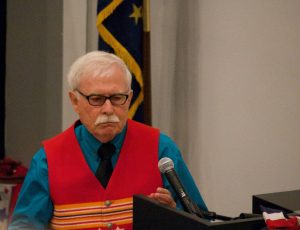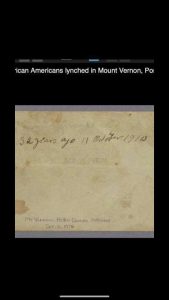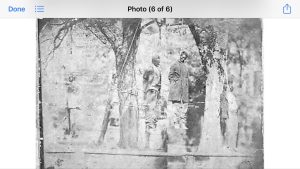In October 2022 Posey County, Indiana finally erected a memorial to the murders of five Black men on the courthouse campus the evening of October 12, 1878 and two more Black men earlier that week. For years numerous persons called for such a monument but it took the hard work and dedication of a Mt. Vernon, Indiana teenager, Sophie Kloppenburg, to get it erected. A one-year commemoration ceremony has been organized by Ms. Kloppenburg for 21 October 2023. The public is invited.
Of the thousands of lynchings that have occurred in America over the years most have been the result of mob violence. A group of men, it was almost always white men fueled by prejudice and often alcohol, would rather spontaneously agree to “exact revenge” or “solve a problem” or some other ill-conceived motivation and proceed to use Judge Lynch instead of asking the legal system to address the situation with due process of law.
However, occasionally some of a community’s citizens would organize and carefully plan the murders and a coverup. That truly frightening situation is what occurred in Posey County, Indiana the autumn of 1878. As reported in the October 17, 1878 edition of the Western Star newspaper by owner and editor John Leffel who was an eyewitness to the events:
“Your reporter and one or two others privileged to enter the jail ran out into the beautiful Court House yard, shaded with heavy locusts. The night was clear, and a bright moon pouring its light down, made the scene ghostlike and impressive.
The crowd, consisting of two or three hundred, fell back across the street. For ten minutes it appeared to be a false alarm. But then was heard the steady tramp of two hundred feet, and a few minutes later fifty men entered the east gate and fifty men entered the north gate. The miserable guilty wretches on the inside began to pray and call on God to save them. But the one hundred men, the best of the county physically and probably in reputation, marched into the yard in files of two. Every man had on a long black mask, falling from forehead to chin, like the inquisition of old. All had changed their coats, some were turned inside out. Not a word was spoken until the leader demanded the keys to the jail.”
After the murders, Posey Circuit Court Judge William F. Parrett, Jr. convened a Grand Jury that returned a verdict that the seven Black men had been murdered by “a person or persons unknown.” Such a denial of justice defied credibility but was given lip service and silence by Posey County’s entire legal system as well as much of the populace.
While the actions of a disorganized mob would have certainly been awful, the well planned and disciplined murders and cover up bring to mind the terrifying evils of governmental power corrupted. When editor Leffel printed that JUDGE LYNCH had held court, the irony remains poignant. To judge in a court of law is everything a lynching is not. It is an oxymoron that the events of October 1878 and judging were juxtaposed.
However, thanks to the memorial marker that now stands where the locust trees upon which four of the seven murdered Black men were lynched, at least the great injustice is now publicly recognized.



